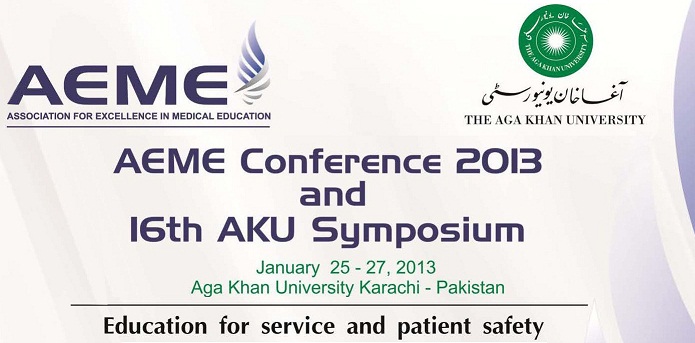Day 1 : Oral Presentations (Theme: Curriculum Innovations)
Integrated communication skills teaching in a hybrid curriculum with problem-based learning: Does it improve patient-physician consultation skills?
Location
AKU Auditorium
Start Date
26-1-2013 10:50 AM
Abstract
Background: The consultation skills of two randomly selected student groups were evaluated in a quasi-experimental study through a standardized OSCE at the end of year 3 and year 5 between two medical colleges with similar curricula, one with and one without a communication skills program.
Methods: A quasi-experimental study based on a four station OSCE was conducted on a total of 52 and 41 year three and year 5 randomly selected students from two private universities with PBL Curricula; one with and one without a longitudinal communication skills program. A Seven point rating scale based on the Cambridge- Calgary Guide was used. Independent samples t-test and Repeated Measures ANOVA were used to compare overall and construct scores between the two universities.
Results: Between universities, at the end of year 3,OSCE scores were higher in the intervention site in three stations although the difference was insignificant. The scores were significantly higher in the constructs of “Initiating the Session” (p-value=0.019), ‘Understanding the Patients Perspective’ (p-value)
Conclusions: Addition of communications skills’ teaching at a university has progressively improved consultation skills, although statistically insignificantly. Improvement in breaking bad news may be due to repeated teaching and practice. It appears that these skills are primarily imbibed through role model observations, clinical practice and feedback. Lasting learning of skills can be achieved through additional spiral integration, faculty development and enhanced multimodal assessment.
Key words: communication skills, OSCE, undergraduate, curriculum, longitudinal
Integrated communication skills teaching in a hybrid curriculum with problem-based learning: Does it improve patient-physician consultation skills?
AKU Auditorium
Background: The consultation skills of two randomly selected student groups were evaluated in a quasi-experimental study through a standardized OSCE at the end of year 3 and year 5 between two medical colleges with similar curricula, one with and one without a communication skills program.
Methods: A quasi-experimental study based on a four station OSCE was conducted on a total of 52 and 41 year three and year 5 randomly selected students from two private universities with PBL Curricula; one with and one without a longitudinal communication skills program. A Seven point rating scale based on the Cambridge- Calgary Guide was used. Independent samples t-test and Repeated Measures ANOVA were used to compare overall and construct scores between the two universities.
Results: Between universities, at the end of year 3,OSCE scores were higher in the intervention site in three stations although the difference was insignificant. The scores were significantly higher in the constructs of “Initiating the Session” (p-value=0.019), ‘Understanding the Patients Perspective’ (p-value)
Conclusions: Addition of communications skills’ teaching at a university has progressively improved consultation skills, although statistically insignificantly. Improvement in breaking bad news may be due to repeated teaching and practice. It appears that these skills are primarily imbibed through role model observations, clinical practice and feedback. Lasting learning of skills can be achieved through additional spiral integration, faculty development and enhanced multimodal assessment.
Key words: communication skills, OSCE, undergraduate, curriculum, longitudinal

